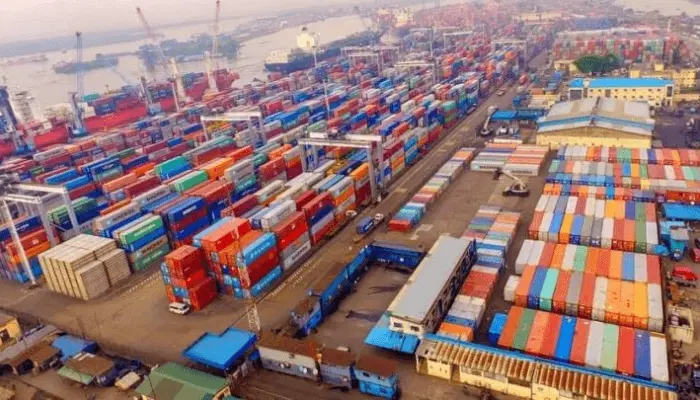The Sea Empowerment Research Centre has said that with the right investments, policies and regulations, the maritime industry can play a crucial role in driving the country’s economy and connecting it to global market.
The Center added that it is essential to address the myriad of challenges plaguing the industry and implement reforms that will enhance the efficiency and competitiveness of Nigerian ports to improve the industry’s global ranking.
The Center stated this in its New Year bulletin titled, ‘Critical Review of the Nigeria Maritime Industry (Performances and Issues) in 2024.’ The bulletin was signed by Head of Research, Sea Empowerment Research Center, Forwarder Eugene Nweke.
The findings also affirmed that the government must work towards creating a more favourable business environment with a stable and predictable foreign exchange rate to attract investments and stimulate growth in the maritime sector.
Reviewing how the maritime industry fared in 2024, the Center undertook a general overview of the industry: the global ranking of the nation’s port, the critical sectors and the impact of the foreign exchange rate policy especially, in the international trade arena, the port sub industry, and as a way forward, proffered solutions and suggestions for 2025.
The centre’s review of the industry on the one hand showed significant growth and potential, with Nigeria being a major oil-producing and exporting country.
Additionally, it showed that despite the industry’s potentials, it faces several challenges that hinder its growth and development.
According to the review: “Presently, the Nigeria maritime industry is ranked 48th in terms of merchant shipping fleet, with the country’s shipping sector contributing an insignificant 1.6 million tonnage to the world’s merchant shipping fleet in 2019.
“As for the global port ranking, Nigeria’s ports are ranked 183rd out of 185 countries in terms of efficiency, according to the World Bank’s Trading across border indicator.
“This ranking is due to various challenges such as delay of import/export processes, unofficial charges, human interface, technical breakdown, and security concerns that are prevalent in Nigerian ports.
“Thus, while port predictability and competitiveness appears a foul cry, the ports delivery corridors are also bedeviled by human barrier elements, impeding the fluidity of prompt cargo delivery. Indeed, this global ranking is more or less a testimonial, constituting and pointing at how our maritime industry faired in 2024, “the review stated.
Meanwhile, the review noted that the industry is hampered by several challenges including the issue of safety and security with piracy, sea robbery and illegal bunkering, while highlighting the role played by NIMASA and Tantita Security in tackling these monsters.
Also, the research showed that the shipping sector is still navigating some challenges but acknowledged that there are also opportunities for growth and investments.
COMMENT L’INDUSTRIE MARITIME PEUT MOTEUR L’ÉCONOMIE ET LA CONNECTER AU MARCHÉ MONDIAL
Le Sea Empowerment Research Center a déclaré qu’avec les investissements, politiques et réglementations appropriés, l’industrie maritime peut jouer un rôle crucial dans la conduite de l’économie du pays et dans sa connexion au marché mondial.
Le Centre a ajouté qu’il est essentiel de relever la myriade de défis qui affligent l’industrie et de mettre en œuvre des réformes qui amélioreront l’efficacité et la compétitivité des ports nigérians afin d’améliorer le classement mondial de l’industrie.
Le Centre l’a déclaré dans son bulletin du Nouvel An intitulé « Examen critique de l’industrie maritime du Nigeria (performances et problèmes) en 2024 ». Le bulletin a été signé par le responsable de la recherche du Sea Empowerment Research Center, le transitaire Eugene Nweke.
Les conclusions affirment également que le gouvernement doit œuvrer à la création d’un environnement commercial plus favorable avec un taux de change stable et prévisible pour attirer les investissements et stimuler la croissance dans le secteur maritime.
En examinant comment l’industrie maritime s’est comportée en 2024, le Centre a entrepris un aperçu général de l’industrie : le classement mondial du port du pays, les secteurs critiques et l’impact de la politique de taux de change, en particulier, dans l’arène commerciale internationale, le sous-port l’industrie et, comme voie à suivre, a proposé des solutions et des suggestions pour 2025.
L’examen du secteur par le centre a montré, d’une part, une croissance et un potentiel importants, le Nigeria étant un pays producteur et exportateur majeur de pétrole.
En outre, il a montré que malgré le potentiel de l’industrie, elle est confrontée à plusieurs défis qui entravent sa croissance et son développement.
Selon la revue : « Actuellement, l’industrie maritime du Nigéria est classée 48e en termes de flotte de marine marchande, le secteur maritime du pays contribuant pour un montant insignifiant de 1,6 million de tonnage à la flotte de marine marchande mondiale en 2019.
« En ce qui concerne le classement mondial des ports, les ports du Nigeria sont classés 183ème sur 185 pays en termes d’efficacité, selon l’indicateur du commerce transfrontalier de la Banque mondiale.
« Ce classement est dû à divers défis tels que les retards dans les processus d’importation/exportation, les frais non officiels, l’interface humaine, les pannes techniques et les problèmes de sécurité qui prévalent dans les ports nigérians.
« Ainsi, même si la prévisibilité et la compétitivité des ports semblent être un cri d’horreur, les couloirs de livraison des ports sont également en proie à des barrières humaines, qui entravent la fluidité d’une livraison rapide des marchandises. En effet, ce classement mondial est plus ou moins un témoignage, constituant et indiquant la performance de notre industrie maritime en 2024 », indique la revue.
Dans le même temps, l’étude a noté que l’industrie est entravée par plusieurs défis, notamment la question de la sûreté et de la sécurité avec la piraterie, le vol en mer et le ravitaillement illégal, tout en soulignant le rôle joué par NIMASA et Tantita Security dans la lutte contre ces monstres.
En outre, la recherche a montré que le secteur du transport maritime est encore confronté à certains défis, mais a reconnu qu’il existe également des opportunités de croissance et d’investissement.



